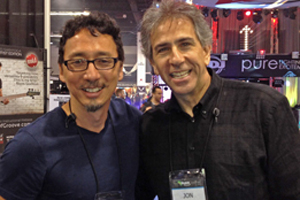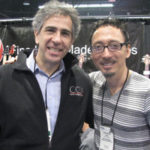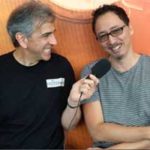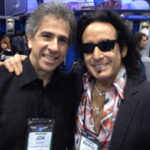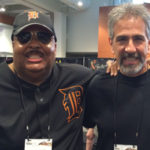Christian rocker talks to FBPO about the Lincoln Brewster gig, clinics, equipment and new CD
Exclusive interview with FBPO’s Jon Liebman
March 15, 2010
Norm Stockton is a bassist/composer/educator with extensive experience in a wide array of musical settings, ranging from jazz work with guitarist Steve Laury (solo artist, Fattburger), keyboardist Rob Mullins (solo artist, The Crusaders) and bassist Dominique DiPiazza (John McLaughlin Trio, Front Page) to arena rock as the touring and recording bassist with worship artist Lincoln Brewster.
Norm’s solo CD debut, Pondering the Sushi, garnered positive feedback from print and online media, including Bass Player, Jazziz, Bass Frontiers, Basically.net, GlobalBass.com and other acclaimed publications. His latest CD, Tea In the Typhoon, was released in November 2009.
Photo credit: Neil Zlozower
FBPO: Let’s start at the beginning. Where are you from? What kind of musical upbringing did you have?
NS: I was born and raised in Japan excepting five years in Hawaii. After graduating from high school, I moved to Southern California and have lived here ever since. My musical upbringing was mostly limited to watching my older siblings burn! My brother and sister were stunning classical musicians as kids. They played guitar and piano, respectively. My parents made me take piano lessons briefly, but I never had a passion for it. I didn’t get serious about music until I was a teenager.
FBPO: How did you end up as a bass player?
NS: My friends and I were fanatically into the Beatles when I was in 10th grade. I’m not that old, by the way! We were into them at a time when a lot of our schoolmates weren’t. I’m sure my story is similar to thousands of others over the decades: I heard Paul McCartney’s bass lines and decided to try to play them after taking a few strings off of an old acoustic guitar. Within a few months, I bought a bass and dove in headfirst.
FBPO: How long have you been with Lincoln Brewster? How did that gig come about?
NS: Back in 2003, Linc, drummer Will Denton (dc Talk/LeAnn Rimes) and I jammed together at a worship conference up in Seattle. It was a blast and went over really well. I’d run into him a couple times a year when our paths crossed on the road, but we didn’t play together again until 2006 when his bass player needed to sub out a few gigs. Several months later, that bassist moved to Nashville with another band and Linc called to offer me as many of his upcoming dates as I could accommodate. I’ve been touring and recording with him ever since.
FBPO: In addition to being a writer and performer, you’re also an educator and clinician. How do you help your students find that balance between, on the one hand, becoming great players, and, on the other, preparing to make a living?
NS: One of the main things I strive to do is help others not have to learn lessons the hard way like I did. Much of the most significant musical growth I’ve experienced has come via the school of hard knocks, and it doesn’t need to be that way!
I think the most important factors for success as a vocational bassist are developing a groove-centric, ensemble-oriented approach, having a broad musical vocabulary and having the ability to sound authentic in a wide range of musical genres. Learning how to read, gaining a solid understanding of diatonic harmony that can be applied in the moment and having a tone that is appropriate to the particular context are vitally important, as well.
I’ve never been hired based upon my ability to tap or play artificial harmonics and I could say with reasonable confidence that neither have most of the players reading this. It’s simply not what is required in 99% of real-world musical settings. On the other hand, if a bassist can come in and play down a chart with the right feel and phrasing, playing parts that support the emotion and cadence of the song, that person’s phone will always ring.
Equally important is being reliable, easy to get along with and a generally encouraging person. Though these factors aren’t musical, they’re critical to success as a working musician.
I try to illuminate that approach, particularly to those who are obsessed with speed or flash, as I was earlier in my playing experience. While many great players have the ability to deliver bass pyrotechnics, the ones who are the most in demand are usually the players who are primarily all about song support and the groove. The rest is just the icing on the cake.
FBPO: Tell me about your solo CD releases, Pondering the Sushi and the new one, Tea in the Typhoon.
NS: My debut CD as a leader was Pondering the Sushi, which was released in 2001. It was a fun creative outlet for me, as many who knew of my playing at that time were only familiar with me through my Grooving for Heaven instructional videos. It was a blast having a chance to cut loose and express a different part of what I do as a musician. Stylistically, it was contemporary jazz with a handful of different influences, like funk, latin, fusion, etc. I was elated that it was really well received and continues to sell to customers around the world.
There was an eight-year lapse between that first project and Tea In The Typhoon, which was just released a few months ago. I didn’t intend for such a long interval to pass, but I’ve been up to my earlobes with other projects, including volumes 3 and 4 of my instructional DVDs, a handful of other CD projects and preparing 3 levels of online curriculum.
I’m really excited that Tea In The Typhoon is finally completed and has been receiving incredibly encouraging reviews in the press and from players around the world. I was so humbled to have some of my favorite musicians contribute, including John Patitucci – with Sachi, his wife and an fantastic cellist – Michael Manring, Gregg Bissonette, Etienne Mbappe, Lincoln Brewster and a handful of other unbelievable players. This project shares similar stylistic influences with Pondering the Sushi, but also reflects my love of West African music, particularly in some of the grooves with that “6-over-4” thing. I absolutely love that!
FBPO: What kind of equipment are you using these days?
NS: I’m a huge fan of MTD (Michael Tobias Design) basses. My main bass, except for my work with Lincoln Brewster, is an MTD 535. It’s been my favorite bass since I acquired it in 1997. It’s an absolutely fantastic instrument. Lincoln’s music lends itself to a narrower sonic footprint, so Michael Tobias built me an MTD J5. It’s phenomenal for more of the rock thing as it’s very aggressive and fits nicely into the mix between big drums, layers of guitars, vocals, etc. I have a handful of other basses for recording work, including several other MTDs, a ’65 P-bass and ’63 Hofner 500/1 “Beatlebass.”
I’ve been enthusiastically using Gallien-Krueger amps and speakers since 2004. My main rig is a 1001RB head I use with various combinations of their Neo cabs. I own a 212, 112 and 115 and choose the most appropriate ones based on the size of the venue. The amp sounds amazing, is extremely versatile, has tons of headroom and is also a great value.
All of my MTDs are strung with MTD stainless steel roundwound strings (45-65-85-105-135x). I love them!
For live work with Lincoln, I’ve been using a SansAmp bass DI for several years, but have recently been exploring some other alternatives, among them the Aguilar Tone Hammer and TLC Compressor pedals. Haven’t made final decisions yet, but they do sound pretty great…stay tuned! For Linc’s current recording project, slated for release in September 2010, we’ve been running the J5 into a Reddi tube direct box and it sounds amazing.
My home studio is based around a ProTools HD-1 system running on a Mac Pro. I generally plug my bass directly into an API A2D mic pre that has a digital out into ProTools. The MTD 535 running through the API gets what I consider my best recorded tone to date. That was the signal path for all of my stuff on Tea In The Typhoon.
FBPO: You strike me as someone who has a lot of energy. What lies ahead for you in your career?
NS: My energy levels ebb and flow!
I am grateful to be doing what I’m doing. I honestly don’t have an exact idea of what lies ahead, as I really try to hold my plans with open hands. Over the years, I’ve learned that God has a much better plan for me than anything I can strategize or try to manipulate into being.
I hope to continue to work with Lincoln Brewster while also fitting in some playing with my own band, The Norm Stockton Group. I also hope to continue doing clinics, sessions and creating more instructional resources, as much as possible.
I have an unbelievably great and supportive wife and daughters, which is incredibly helpful in terms of accomplishing any of the above!
FBPO: What do you like to do that doesn’t necessarily involve music?
Other than spending time with my family, I’m a big fan of sailing and sailboat racing. I’ve been into it since I was a kid in Japan and, later, in Hawaii. My schedule lately hasn’t allowed me much time on the water, so I’ve compensated by reading yachting magazines and watching YouTube clips! Ha!
I also love travel – although it does frequently involve music! – good food, especially Japanese, but Italian & Mexican are close seconds, and Saab 900s.
